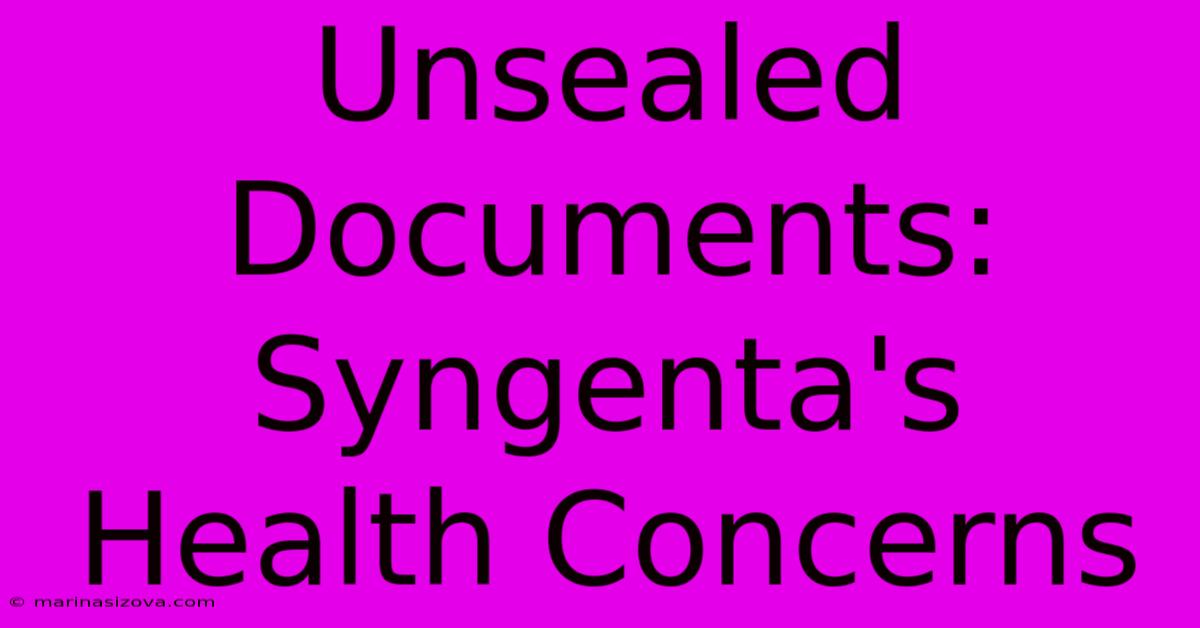Unsealed Documents: Syngenta's Health Concerns

Discover more detailed and exciting information on our website. Click the link below to start your adventure: Visit Best Website. Don't miss out!
Table of Contents
Unsealed Documents: Syngenta's Health Concerns Raise Alarm Bells
The recent unsealing of documents related to the pesticide Atrazine, a popular herbicide manufactured by Syngenta, has reignited concerns about its potential health risks. These documents, part of a long-running legal battle, reveal a disturbing picture of the company's knowledge and actions regarding the herbicide's potential to harm human health and the environment.
What are the Concerns?
The documents shed light on several troubling issues, including:
1. Atrazine's Potential to Disrupt Hormones: The documents show that Syngenta was aware of studies linking Atrazine to endocrine disruption, which can interfere with the body's hormonal balance. This has significant implications for reproductive health, particularly in men and women.
2. Cancer Risks: The documents suggest that Syngenta may have downplayed or suppressed evidence linking Atrazine to an increased risk of certain cancers. This includes studies linking the herbicide to non-Hodgkin's lymphoma, a type of blood cancer.
3. Environmental Contamination: Evidence suggests that Atrazine can persist in the environment, contaminating water sources and potentially harming wildlife. The documents highlight the company's knowledge of this potential risk and its efforts to downplay its impact.
4. Lack of Transparency: The unsealed documents reveal a pattern of Syngenta prioritizing profit over transparency, allegedly withholding critical information from regulators and the public about the true risks of Atrazine.
What Does This Mean for Consumers?
These revelations raise serious questions about the safety of Atrazine and its continued use. While the scientific community is still debating the full extent of its risks, the evidence suggests that Atrazine may pose a significant threat to human health and the environment.
Consumers should be aware of the following:
- Choose organic alternatives: Opt for organic produce whenever possible, as it is free of synthetic pesticides like Atrazine.
- Be informed about pesticide residues: Check labels and consult resources like the Environmental Working Group (EWG) to learn about pesticide residues on food.
- Advocate for stricter regulations: Support organizations working to ban or restrict the use of Atrazine and other harmful pesticides.
The Path Forward
The unsealed documents have reignited the debate about the safety of Atrazine and its potential health and environmental impacts. They have also raised concerns about the integrity of the pesticide industry and the need for greater transparency.
It is essential for regulatory agencies to scrutinize the evidence carefully and take action to protect public health and the environment. Consumers also have a responsibility to be informed and to demand safer alternatives.
The ongoing legal battle and the public scrutiny surrounding Atrazine highlight the critical need for a thorough evaluation of pesticide safety and a commitment to transparency in the industry. This is not just about protecting ourselves; it's about ensuring a healthy and sustainable future for generations to come.

Thank you for visiting our website wich cover about Unsealed Documents: Syngenta's Health Concerns. We hope the information provided has been useful to you. Feel free to contact us if you have any questions or need further assistance. See you next time and dont miss to bookmark.
Featured Posts
-
Autoneum Holding Vtx Autn Kurssteigerung Bei Sinkenden Ertraegen
Oct 29, 2024
-
Syngentas Profitable Herbicide Hidden Concerns
Oct 29, 2024
-
Koncert Tylera The Creatora W Tauron Arenie
Oct 29, 2024
-
Kiwi Loss Kangaroos Player Ratings Revealed
Oct 29, 2024
-
Ransonering Av Laekemedel En Moejlig Verklighet
Oct 29, 2024
